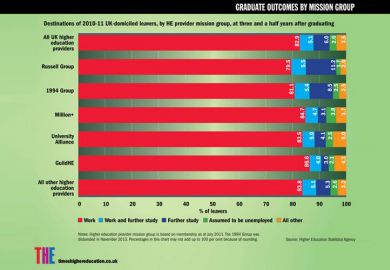Government figures have revealed for the first time the extent of the earnings gap that graduates in law from different English universities can expect in new pilot data on employment outcomes.
While the median earnings of law graduates from the University of Oxford are £61,500 five years after graduation, median earnings for a law degree from the University of Bradford are £17,500 – £44,000 a year less. The University of Cambridge was just below Oxford with earnings of £54,500, while graduates of the University of Bedfordshire are only slightly better off than those of Bradford with salaries of £18,000.
Although the government stated that its new dataset does not look at overall graduate earnings by institution because they can be “strongly influenced by subject mix”, it is using the law graduate employment data as a pilot to get “user feedback” ahead of a planned spring 2017 release of graduate salary data by subject.
“We have chosen to pilot outcomes for law graduates as we can report outcomes for a large number of institutions,” the government reported. “Not all institutions offer all subjects; however, we are able to present employment and/or earnings outcomes for law graduates in 76 institutions.”
This is the first time that the government has used its new Longitudinal Education Outcomes (LEO) data – which are based, among other things, on tax records – to present information on graduate employment outcomes for each higher education institution in England, although it points out that the publication uses “experimental statistics”.
It further noted that differences in institution-level outcomes can be influenced by numerous factors “beyond the educational benefits provided by that institution”, including the subject mix offered, the characteristics of the student intake, and whether certain universities’ graduates take up activities that the data do not capture well, such as self-employment or working abroad.
Although the law graduate figures, based on those who left university in 2008-09, present a stark picture of earning potential for first degree holders at different UK universities, the sector has warned of the risk of using such raw data to measure graduate outcomes as part of the teaching excellence framework (TEF).
“If used as part of TEF, [LEO data] should be benchmarked,” said Maddalaine Ansell, University Alliance chief executive. “Since salary varies according to geography, subject studied and even parental income, raw earnings data should not be used to measure outcomes as part of the teaching excellence framework.
“If properly contextualised to take into account local and regional labour markets, [LEO] has the potential to provide useful information for prospective students choosing courses once the time-lag issue has been addressed: currently it only includes data that are eight years out of date.”
Her concerns were echoed by Pam Tatlow, chief executive of MillionPlus, who said that the use of LEO data was “extremely limited” and urged the government not to use them as an additional metric for the TEF.
“LEO relies on Her Majesty’s Revenue and Customs pay as you earn (PAYE) data and fails to capture the full range of graduate employment patterns, including in sectors such as the creative industries, where portfolio careers and self-employment are common,” she said.
“Ministers should resist the temptation of including the LEO data as an additional metric in the TEF. Even as it stands, the LEO data provide only a very partial picture of the value of participating in higher education and have nothing to do with the quality of teaching.”
Top institutions for graduate law earnings after first degree, according to LEO data
| Institution | Number of graduates | Median earnings (five years after 2008-09 graduation) |
| University of Oxford | 120 | £61,500 |
| University of Cambridge | 105 | £54,500 |
| London School of Economics | 50 | £47,500 |
| University College London | 55 | £47,000 |
| University of Warwick | 75 | £41,500 |
| Durham University | 75 | £40,500 |
| University of Nottingham | 95 | £38,000 |
| University of Bristol | 95 | £37,500 |
| King’s College London | 125 | £37,000 |
| University of Manchester | 135 | £35,500 |
Bottom institutions for graduate law earnings after first degree, according to LEO data
| Institution | Number of graduates | Median earnings (five years after 2008-09 graduation) |
| University of Bradford | 60 | £17,500 |
| University of Bedfordshire | 35 | £18,000 |
| University of Derby | 70 | £18,500 |
| University of Wolverhampton | 170 | £19,500 |
| Bucks New University | 25 | £19,500 |
| Birmingham City University | 85 | £19,500 |
| Edge Hill University | 45 | £19,500 |
| Middlesex University | 75 | £20,000 |
| London Metropolitan University | 95 | £20,000 |
| University of Huddersfield | 60 | £20,000 |
| De Montfort University | 165 | £20,000 |
| University of Lincoln | 80 | £20,000 |
Register to continue
Why register?
- Registration is free and only takes a moment
- Once registered, you can read 3 articles a month
- Sign up for our newsletter
Subscribe
Or subscribe for unlimited access to:
- Unlimited access to news, views, insights & reviews
- Digital editions
- Digital access to THE’s university and college rankings analysis
Already registered or a current subscriber?






